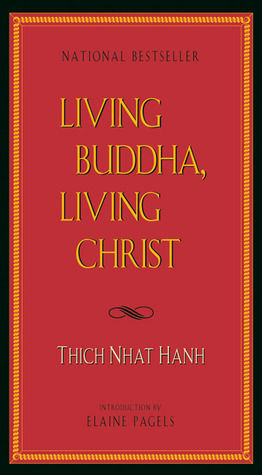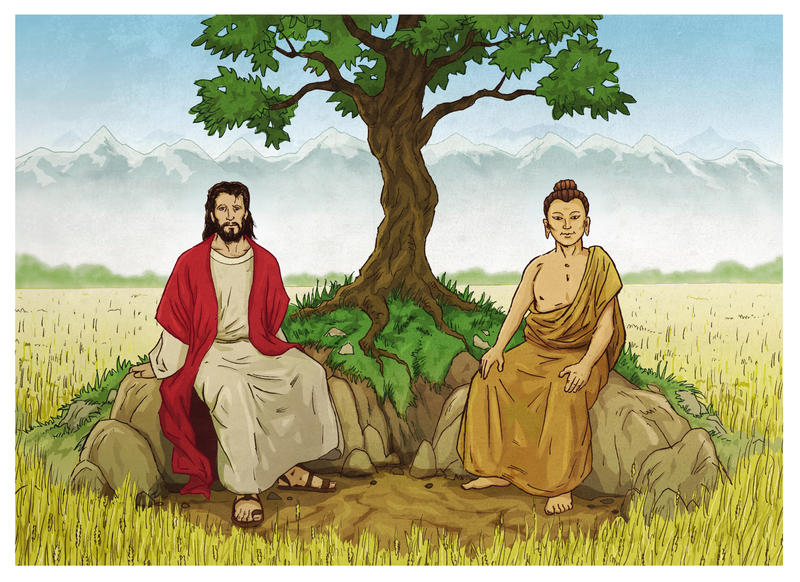Thich Nhat Hanh - Living Buddha, Living Christ
- Gunnar Thurman
- Jul 17, 2021
- 7 min read
Updated: Jul 17, 2021

In Living Buddha, Living Christ, Thich Nhat Hanh seeks to compare Buddhism to Christianity in an effort to find common ground between the two. He focuses on many aspects of Christianity, namely traditional Catholicism, that are in line with Buddhism, sharing comparisons and related qualities between them both. He sees Christ as a great spiritual leader, who was teaching pure truths and principles that anyone ought to strive to live by, that were perfectly in line with what the Buddha taught as well. I felt that the book was a success, and promotes an ideal that we ought to live up to regardless of our religious leanings. This didn't end up so much a book review as it was a smattering of my own thoughts that came to mind as I read and reflected on what I liked about this book. I do highly recommend it, though.

I am a big proponent of religious tolerance, and it is something I think about a lot. I feel driven to this by the fact that the general mass of Christianity, since I've started paying attention to it (myself included) has often felt like something was lacking, distancing itself from what it means to emulate the center of Christianity: Jesus Christ. Uncharitable calls for the removal of people of other religions and races from our communities and countries coupled with a complete lack of willingness to have open discussion with those different from ourselves proves to me that if a Book of Revelations style end-of-the-world is on the way, it's closed-minded Christians themselves who are going to bring it about faster than anyone else. Many of the groups that Christians tend to rally against are often more willing to have a conversation or love others than we are. This attitude does not seem to be intentional but stems from a centuries-long system of the misunderstanding of ourselves and others.
In many cases, we have forgotten the simplicity and joy that a life spent emulating Christ ought to bring. The gloom of fire and brimstone created a culture of guilt, judgement, and inadequacy that I believe lies in the very roots of classic Christianity beginning after Christ's death. So many of us grapple with feeling utterly guilty for each breath we take. There are certain topics or ways of thinking that are “not allowed” because it might make others uncomfortable, and you won’t be able to be in the “club” anymore. This isn't the way that Christ's teachings are meant to be used or interpreted. Using fear and guilt to keep people in line with an idea is wrong, whether or not it is intentional or completely by accident. We should be able to talk through our differences and grapple with challenging life circumstances that don't fit perfectly into the mold of what we're used to in our communities.

"Real dialogue makes us more open-minded, tolerant, and understanding. Buddhists and Christians both like to share their wisdom and experience. Sharing in this way is important and should be encouraged. But sharing does not mean wanting others to abandon their own spiritual roots and embrace your faith."
Love, acceptance, patience, and a genuine desire to care for and listen to others is what Christians and Buddhists need just as much as anyone else. The need to make everyone else a Christian by whatever means necessary, or at least the inability to understand why anyone wouldn't want to drop everything and convert to Christianity is another problem; it demonstrates a lack of awareness of ourselves and others that has become so prevalent. It is okay to share what one believes, but if we want to truly show people what a Christian ought to be, then why wouldn't we spend time learning about and understanding others' beliefs as well? Do we consider that to be a waste of our precious time? Forming loving relationships with people of all walks of life is exactly what lives in the heart of the teachings of Christ. If someone is interested in your religion and wants to learn more, then we ought to share with them as much as they would like us to. If this leads to a conversion, then we should be happy for them and offer our assistance and companionship. But if they do not wish to go this far, then we should still love them and maintain our relationship with them. Even if we are surrounded by people who are "the same" as us, we can still educate ourselves about different kinds of cultures and/or religions, learning to foster feelings of love towards all.
"Religious experience is inevitably human experience. It has to do with the human consciousness, both individual and collective. In Buddhism, religious practice begins with mindfulness. As the practice deepens and mindfulness becomes more sustained, the practitioner is able to touch, feel, see, and understand more deeply. Understanding makes love and compassion possible, and when love and compassion are present, understanding deepens. The practitioner learns how to practice to maintain mindfulness and help it grow. She knows that while mindfulness is alive, transformation can take place."
It's far more desirable to love our neighbor than to hate them, but collectively we seem to be more and more capable of blinding ourselves to truth and reality in the name of religion. As more and more of us latch onto these attitudes, believing that anyone different from ourselves is "wrong", it becomes more and more normal. Suddenly, the entire community is supporting one another in prejudice and blindness. This is especially dangerous when we associate this kind of closed-mindedness obedience to politics and education. There is no “us and them”, there is only “we”. We all breathe the same air and inhabit the same floating rock in the cosmos. If we think that God loves us more because of the color of the rectangle on our flagpole than that of our neighbors, or that being both educated and religious are incompatible with one another, perhaps we ought to reconsider how we got to where we are now. Even if we have a bad experience with an individual, this doesn't serve to represent that person's entire demographic, whatever it be. We wouldn't want someone who had a bad encounter with a Christian to be prejudiced against all Christianity.

Buddhism, for me, is an excellent balm to all of this. I genuinely believe that many of the world's problems would not so much be solved, as they would slowly fade away, if every person took 15 minutes a day in quiet solitude, free of distraction, in which they focus on the present moment. I struggle with this, because it is genuinely harder than it sounds to make it a habit. It serves to ground oneself to nature and the world around us. Learning to clear the clutter of the mind and free one's self of the feelings that drive us to guilt, the medicine cabinet, and the comment section is essential to living a joyful life. The feeling of "being right" and/or utter dread you get when you watch the news isn't normal. You shouldn't feel like you need to go out and fight another group of people different from you when you peel your eyes off the screen. Buddhism promotes tolerance, discussion, truth, love, self-care, understanding, and deep compassion. Christianity promotes all of these things too, and yet in my view, many Christians (myself included) lack any number of these qualities, blinded by our news networks and societal/generational attitudes and opinions. If you only surround yourself with people and media that agree with your first impulses, confirming all of your own opinions and suspicions, then you are destined to live a poor life, despite any degree of surety that you are doing the right thing.
"Many who looked into the eyes of the Buddha or Jesus were not capable of seeing them. One man who wanted to see the Buddha was in such a hurry that he neglected a woman in dire need whom he met along the way... Whether you can see the Buddha [or Jesus] or not depends on you, on the state of your being."
Ultimately, I think that as a society, at least in the United States, we have lost the ability to accept that when we are wrong. This is a trait that runs deep across all walks of life. Unable to confront reality or accept that an opposing viewpoint might contain some (or many!) elements of truth, we choose to fight instead of loving others and opening our minds to the idea that we might have something to learn from "them". To me, it is a wonderful thing to be proven wrong by someone, because we can then get closer to the truth together. I have had the experience of reconsidering countless attitudes and behaviors that I learned directly from those I grew up around and have been exposed to for years. Just because someone you respect or trust says something does not make it true. An individual, backed up (or at least unopposed) by an entire community, can say things in your church, community, or family that are, at their core, against the very teachings of the religion or philosophy that everyone within are trying to embody. It is entirely up to each individual to work out, using the abundance of resources we have available to us, for themselves, what truth is and root out systemic problems that lie within our circles of society.
"Our capacity to make peace with others depends very much on our capacity to make peace with ourselves. If we are at war with our parents, our family, our society, or our church, there is probably a war going on inside us also, so the most basic work for peace is to return to ourselves and create harmony among the elements within us - our feelings, our perceptions, and our mental states... We must recognize and accept the conflicting elements that are within us and their underlying causes."
I'd highly recommend examining just about everything you believe and looking at it through a simple, pure lens with a desire to rid yourself of anything that might be deceiving you. That might include an opinion, some kind of media outlet, or just a feeling you get. I'm not talking about the things you already know you need to improve upon; this isn't New Year's resolution type stuff. I am referring to the foundational ideas, opinions, and viewpoints you take for granted as being completely right about that you don't think of anymore. I guarantee you'll find that you can afford to change your worldview, drastically to the betterment of yourself and your fellow humans. It's fairly exhausting but highly rewarding. This attitude, coupled with daily moments of quiet reflection and meditation, can surely help you find joy and peace no matter what walk of life you come from. At a minimum, read a few books that expose you to the viewpoints of other people. It doesn't have to be "dangerous", it can help you to grapple with your own beliefs and understand why you do the things you do, as this book and many others have done for me.




Comments